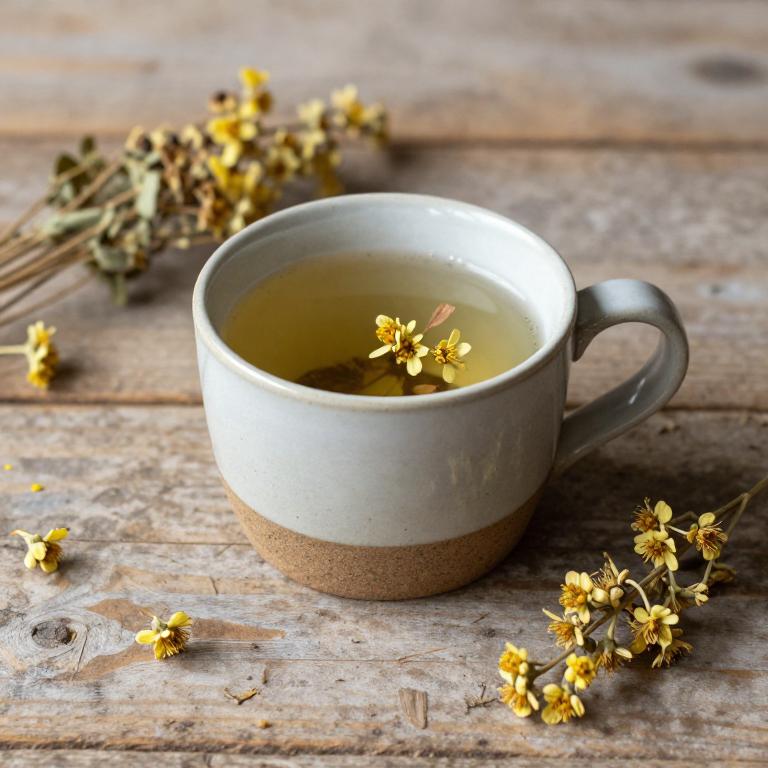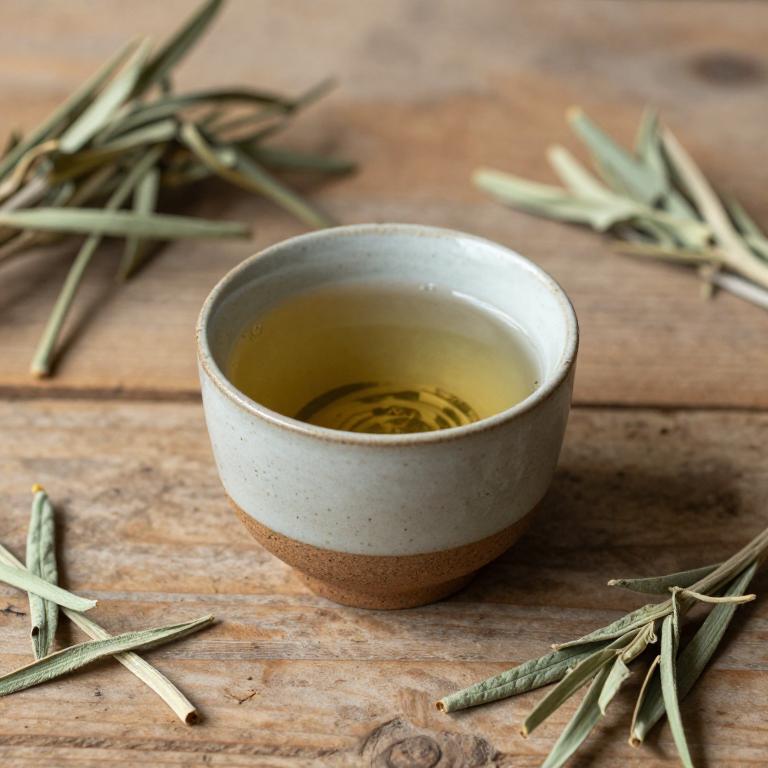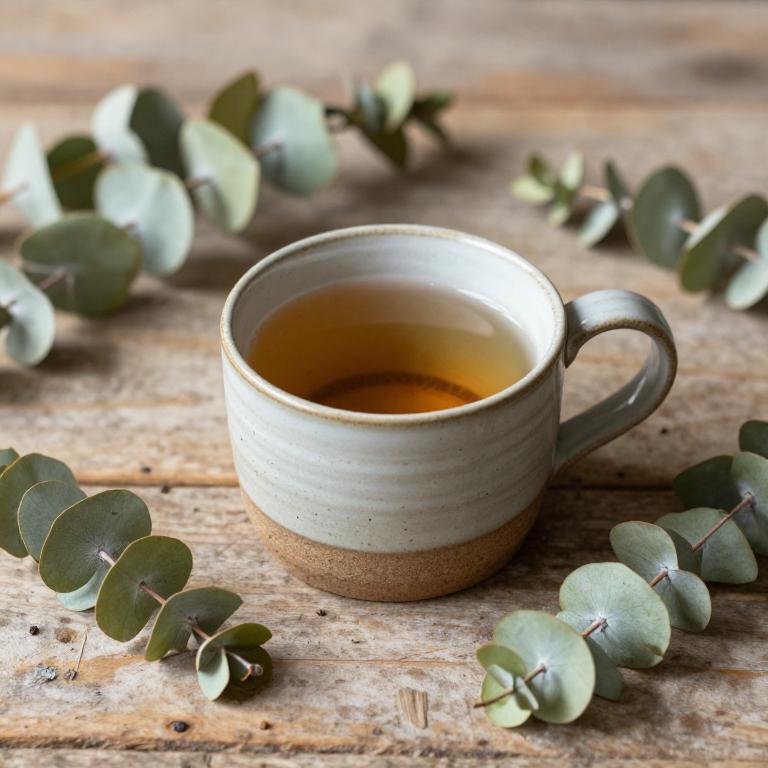10 Best Herbal Teas For Body Odor

Herbal teas can be an effective natural remedy for body odor due to their antibacterial and detoxifying properties.
Ingredients like green tea, peppermint, and chamomile are known to help reduce sweat and neutralize unpleasant smells. These teas work by supporting the body's natural detox processes and balancing internal systems that contribute to odor. Regular consumption of certain herbal teas may help improve overall body hygiene and reduce the need for excessive deodorants.
However, it's important to consult with a healthcare provider before incorporating herbal teas into your routine, especially if you have underlying health conditions.
Table of Contents
- 1. Rosemary (Rosmarinus officinalis)
- 2. Peppermint (Mentha piperita)
- 3. Lemon balm (Melissa officinalis)
- 4. Lemon grass (Cymbopogon citratus)
- 5. English lavender (Lavandula angustifolia)
- 6. Camellia (Camellia sinensis)
- 7. Thyme (Thymus vulgaris)
- 8. Eucalyptus (Eucalyptus globulus)
- 9. Echinacea (Echinacea purpurea)
- 10. Stinging nettle (Urtica dioica)
1. Rosemary (Rosmarinus officinalis)

Rosmarinus officinalis, commonly known as rosemary, is a popular herb used in herbal teas for its refreshing and aromatic properties.
These teas are believed to help reduce body odor by promoting detoxification and improving metabolic processes in the body. The essential oils in rosemary, such as cineole and camphor, have antimicrobial properties that may inhibit the growth of odor-causing bacteria on the skin. Regular consumption of rosemary tea can support overall bodily health, contributing to a more natural and pleasant body scent.
While it is not a substitute for proper hygiene, rosemary herbal tea can be a complementary remedy for those seeking natural ways to manage body odor.
2. Peppermint (Mentha piperita)

Mentha piperita, commonly known as peppermint, is a popular herb used in herbal teas to help manage body odor.
The cooling and refreshing properties of peppermint help to stimulate perspiration, which can aid in the elimination of toxins from the body. Additionally, its natural antibacterial and antifungal properties may help reduce the growth of odor-causing bacteria on the skin. Peppermint tea can also soothe the digestive system, which in turn may help reduce body odor caused by digestive issues.
Regular consumption of peppermint herbal tea is believed to support overall bodily health and contribute to a more natural, fresh scent.
3. Lemon balm (Melissa officinalis)

Melissa officinalis, commonly known as lemon balm, is a popular herb used in herbal teas for its calming and aromatic properties.
This herb is believed to help reduce body odor by promoting a sense of freshness and balance within the body. The essential oils in lemon balm, such as citral and limonene, may help neutralize odors and support digestive health, which can contribute to reduced body odor. Drinking lemon balm tea regularly may also help manage stress and anxiety, which are known factors that can exacerbate body odor.
As a natural and gentle remedy, melissa officinalis herbal tea offers a holistic approach to maintaining a pleasant body scent.
4. Lemon grass (Cymbopogon citratus)

Cymbopogon citratus, commonly known as lemongrass, is a popular herb used in herbal teas to help manage body odor due to its natural antibacterial and deodorizing properties.
The essential oils in lemongrass, particularly citral and geraniol, help neutralize odor-causing bacteria on the skin and in the digestive system. Regular consumption of lemongrass tea can promote healthy digestion, which in turn reduces the buildup of toxins that contribute to body odor. Its refreshing and citrusy aroma also provides a pleasant sensory experience, making it a favored choice for those seeking natural alternatives to conventional deodorants.
Overall, lemongrass tea offers a holistic approach to addressing body odor by supporting both internal health and external freshness.
5. English lavender (Lavandula angustifolia)

Lavandula angustifolia, commonly known as English lavender, is widely used in herbal teas for its soothing and aromatic properties.
This plant is particularly valued for its natural ability to help reduce body odor due to its antimicrobial and deodorizing qualities. The essential oils in lavender tea can help neutralize odors by balancing the skin's natural bacteria, promoting a fresher scent. Regular consumption of lavender tea may also support overall body hygiene and reduce the intensity of unpleasant body odors.
As a gentle and calming herbal remedy, lavender tea offers a natural alternative for those seeking to manage body odor through internal wellness.
6. Camellia (Camellia sinensis)

Camellia sinensis, the plant from which green, black, and white teas are derived, is often used in herbal teas for its potential benefits in reducing body odor.
These teas are rich in antioxidants and catechins, which may help detoxify the body and promote a healthier internal environment. By supporting liver function and digestion, Camellia sinensis herbal teas can aid in reducing the buildup of toxins that contribute to unpleasant body odors. Regular consumption of these teas may also help balance body pH levels, further supporting natural odor control.
However, while some studies suggest potential benefits, individual results may vary, and it is advisable to consult a healthcare professional before incorporating these teas into a routine for body odor management.
7. Thyme (Thymus vulgaris)

Thymus vulgaris, commonly known as thyme, is a popular herb used in herbal teas for its potential benefits in addressing body odor.
The essential oils in thyme, particularly thymol, possess strong antimicrobial properties that can help reduce the growth of odor-causing bacteria on the skin. Drinking thyme tea may support overall bodily detoxification, which can contribute to a more pleasant body odor. It is often used in aromatherapy and natural remedies for its refreshing and cleansing effects.
However, it is important to consult with a healthcare professional before using thyme tea, especially for individuals with allergies or specific health conditions.
8. Eucalyptus (Eucalyptus globulus)

Eucalyptus globulus, commonly known as eucalyptus oil, is often used in herbal teas to help combat body odor due to its natural antimicrobial and deodorizing properties.
The essential oil of eucalyptus globulus contains compounds like eucalyptol and cineole, which can neutralize odor-causing bacteria on the skin. When consumed as a herbal tea, it may support internal detoxification and promote a healthier body environment, indirectly reducing body odor. However, it is important to note that eucalyptus globulus should be diluted properly and used in moderation, as concentrated forms can be toxic when ingested.
While it may offer some benefits, it is not a substitute for proper hygiene and should be used as a complementary natural remedy.
9. Echinacea (Echinacea purpurea)

Echinacea purpurea, commonly known as purple coneflower, is a popular herbal remedy often used to support immune health.
While it is not specifically marketed for body odor, some people believe that its antimicrobial and anti-inflammatory properties may help reduce body odor by combating bacteria that contribute to odor-causing sweat. Drinking echinacea tea may promote overall wellness, which can indirectly influence body odor by improving metabolic function and reducing stress-related sweating. However, there is limited scientific evidence directly linking echinacea to the reduction of body odor.
As with any herbal supplement, it is advisable to consult a healthcare professional before incorporating it into your routine, especially if you have underlying health conditions or are taking other medications.
10. Stinging nettle (Urtica dioica)

Urtica dioica, commonly known as stinging nettle, is a versatile herb that has been used for centuries in traditional medicine.
When brewed into a herbal tea, it can offer various health benefits, including supporting detoxification and improving overall body health. Some people believe that consuming stinging nettle tea may help reduce body odor by promoting internal cleansing and balancing bodily functions. However, it is important to note that while it may contribute to better hygiene and freshness, it is not a guaranteed solution for body odor.
As with any herbal remedy, it is advisable to consult with a healthcare professional before incorporating it into your routine.